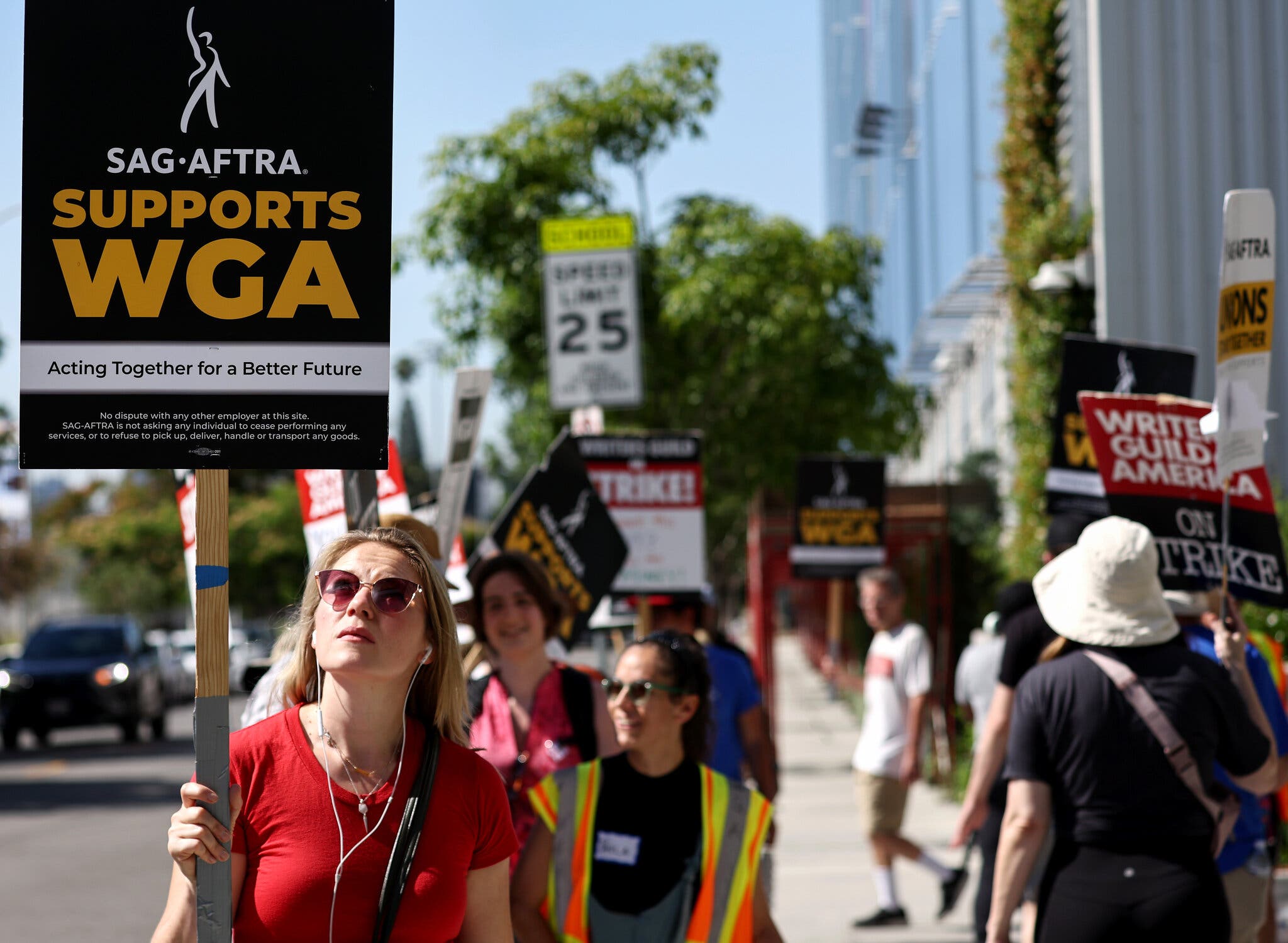Hollywood Production At Standstill Amidst Joint Actors And Writers Strike

Table of Contents
The entertainment industry is facing an unprecedented crisis. The simultaneous strike by the Writers Guild of America (WGA) and the Screen Actors Guild - American Federation of Television and Radio Artists (SAG-AFTRA) has brought Hollywood production to a complete standstill. This joint action, representing thousands of writers and actors, highlights critical issues impacting the future of the industry. This article will explore the causes, effects, and potential resolutions of this historic strike, examining its impact on everything from blockbuster movies to independent productions and streaming services.
The Key Demands of the WGA and SAG-AFTRA
The strike isn't simply about pay; it's about fundamental changes to the way the entertainment industry operates in the age of streaming. Both the WGA and SAG-AFTRA have outlined key demands addressing fair compensation and improved working conditions.
Fair Wages and Residuals in the Streaming Era
The rise of streaming services has fundamentally altered compensation models for writers and actors. Traditional residuals, once a significant part of actors' and writers' income, have dwindled as streaming platforms prioritize subscription revenue over traditional licensing fees. This has led to significant financial instability for many.
-
Specific demands regarding residuals for streaming platforms: The unions are pushing for a fairer share of streaming revenue, reflecting the significant profits generated by these platforms. This includes transparent accounting practices and a formula that better compensates for the continued success of shows on streaming services. They want residuals to be calculated not just on initial viewership but also on the ongoing value of content.
-
The Impact of AI: The increasing use of AI in scriptwriting and potentially in creating digital actors is another major concern. The unions are demanding safeguards to prevent the replacement of human writers and actors with AI, emphasizing the need for fair compensation and creative control.
Improved Working Conditions
Beyond financial concerns, the strike also addresses the grueling working conditions faced by many in the industry. Long hours, demanding schedules, and unsafe work environments are commonplace.
-
Demands for better working conditions: The unions are pushing for reasonable limits on working hours, improved safety protocols on set, and an end to the exploitation of workers. This includes mandatory rest periods and limitations on the number of consecutive days of work.
-
The Issue of Self-Tape Auditions: The proliferation of self-tape auditions has significantly increased the workload for actors, often requiring numerous submissions without guaranteed compensation. The unions are advocating for fair compensation and stricter regulations concerning these auditions.
The Impact of the Strike on Hollywood Production
The joint strike has had a profound and far-reaching impact on the Hollywood production landscape. The effects are felt across all aspects of the industry, from major studio productions to smaller independent films.
Production Shutdowns and Delays
The strike has brought virtually all major film and television production to a halt. Thousands of crew members are out of work, and countless projects have been delayed or indefinitely postponed.
-
Examples of affected productions: High-profile projects such as upcoming Marvel films, network television series, and late-night shows have all been affected by the shutdown. The ripple effect stretches across numerous independent productions as well.
-
Economic consequences: The shutdown impacts not just the actors and writers, but also a vast network of supporting industries, including catering, transportation, and equipment rentals. The economic consequences are significant and widespread.
Impact on Release Schedules and Box Office
The delays caused by the strike will inevitably impact release schedules and, consequently, the box office. Movie releases are being pushed back, and many streaming services are facing content shortages.
-
Delays of upcoming film and television releases: The impact on release dates is extensive, creating uncertainty for studios and fans alike.
-
Impact on box office and revenue: The potential loss of revenue for the entertainment industry is substantial. The strike creates a domino effect, impacting related industries and potentially leading to a decline in overall entertainment consumption.
-
Impact on streaming services: Streaming platforms are also facing significant challenges, with delayed productions impacting their content pipelines and potentially affecting subscriber numbers.
Potential Resolutions and Future of the Strike
The ongoing negotiations between the unions and the Alliance of Motion Picture and Television Producers (AMPTP) are crucial in determining the future of the strike.
Negotiations and Potential Compromises
Both sides are engaging in negotiations, with the unions remaining steadfast in their demands for fair wages, improved working conditions, and safeguards against AI.
-
Ongoing negotiations: The progress of these negotiations is closely followed by industry observers and the public. Reaching a compromise requires both sides to make concessions.
-
Potential compromises: Potential compromises might involve adjustments to residual formulas, improved working conditions, and establishing clear guidelines for the use of AI in the industry.
-
Public support: The strike has received widespread public support, underscoring the importance of the issues at stake.
Long-Term Implications for the Entertainment Industry
The resolution of this strike will have far-reaching consequences, shaping the industry's landscape for years to come.
-
Potential changes in compensation models: The strike could lead to significant changes in how writers and actors are compensated, particularly regarding streaming revenue.
-
Changes in working conditions: The industry might also see improvements in working conditions, addressing concerns about long hours, excessive workloads, and safety on set.
-
Future collective action: The success or failure of this strike could influence future collective action by other entertainment industry workers.
Conclusion
The Hollywood actors and writers' strike represents a critical turning point for the entertainment industry. The issues at stake – fair compensation, improved working conditions, and the responsible use of AI – affect the livelihoods of thousands and the future of storytelling itself. The resolution of this strike will have far-reaching consequences, shaping the industry's landscape for years to come.
Call to Action: Stay informed about the ongoing Hollywood production standstill and the actors and writers' strike. Follow the latest developments and support the efforts to achieve a fair and sustainable future for the entertainment industry. Learn more about the key demands of the WGA and SAG-AFTRA and how you can support the strike. #HollywoodStrike #SAGAFTRA #WGA #ActorsStrike #WritersStrike

Featured Posts
-
 The Chicago Showdown Hailey Van Lith And Angel Reese Confront Past Issues
May 17, 2025
The Chicago Showdown Hailey Van Lith And Angel Reese Confront Past Issues
May 17, 2025 -
 Jalen Brunson Knicks Fan Petition Aims For Statue Of Liberty Face Swap
May 17, 2025
Jalen Brunson Knicks Fan Petition Aims For Statue Of Liberty Face Swap
May 17, 2025 -
 Cowboy Bebop Fortnite Skins Faye Valentine And Spike Spiegel Bundle Price Revealed
May 17, 2025
Cowboy Bebop Fortnite Skins Faye Valentine And Spike Spiegel Bundle Price Revealed
May 17, 2025 -
 Ankle Injury Update Jalen Brunsons Return Imminent
May 17, 2025
Ankle Injury Update Jalen Brunsons Return Imminent
May 17, 2025 -
 Tam Krwz Awr Mdah Ka Ghyr Mtwqe Waqeh Tfsylat
May 17, 2025
Tam Krwz Awr Mdah Ka Ghyr Mtwqe Waqeh Tfsylat
May 17, 2025
